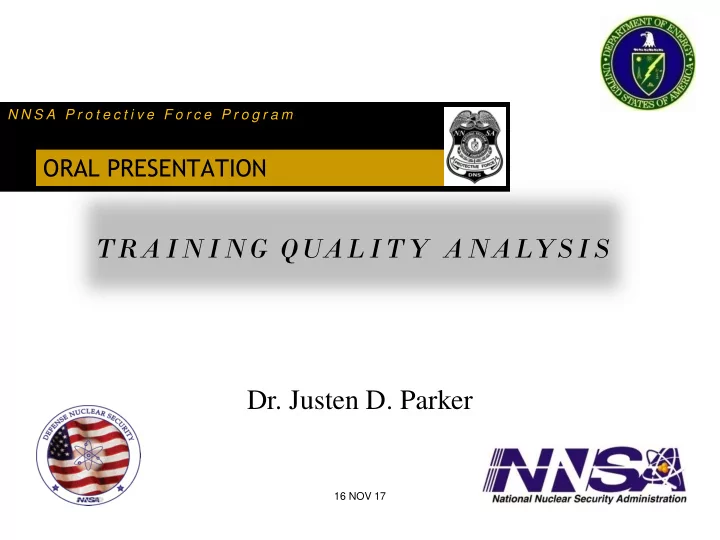

N N S A P r o t e c t i v e F o r c e P r o g r a m ORAL PRESENTATION TRAINING QUALITY ANALYSIS Dr. Justen D. Parker 16 NOV 17
LEADERSHIP CHARACTERISTICS LEADERSHIP – OUTCOMES - PERFORMANCE • Transformational leadership • Idealized Influence (Attributed) • Idealized Influence (Behavior) • Inspirational Motivation • Intellectual Stimulation • Individualized Consideration • Student Outcomes • Extra Effort • Effectiveness • Satisfaction • Moderate to strong correlations • Outcomes mediate higher levels of performance 2
TIME ENGAGED RESULTS • Times captured during training observations Time Time NOT Physical Discussion Listening Prep Engaged Engaged 3900 1567 321 1396 616 1141 31% 6% 28% 12% 77% 23% • Also captured instructor numbers, student numbers, topics, other venues available, actions while not engaged, and comments. • Need to spend more time in Physical “deliberate practice” or active discussions. 3
INSTRUCTOR TRAINING • Instructors should train/deliberately practice • Rehearse student training events “with excellence” • Use the same equipment as students • Improve performance • Provides experience for student training • Determine how and when to use transformational leadership characteristics • Determine how to maximize resources during the training day • Test the training plan – will students meet the objectives 4
TRAINING OBJECTIVES • Were objectives understood prior to training? • Students – “Agree” • Instructors – “Agree” • Were objectives met by the conclusion of training? • Students – “Agree” • Instructors – “Strongly Agree” • Objectives were never specifically communicated • Daily schedules were misinterpreted as training objectives • Objectives come from EMETL assessments • Focus on the specific need for mission performance 5
QUESTIONS? Dr. Justen D. Parker Justen.parker@nnsa.doe.gov 6
Recommend
More recommend